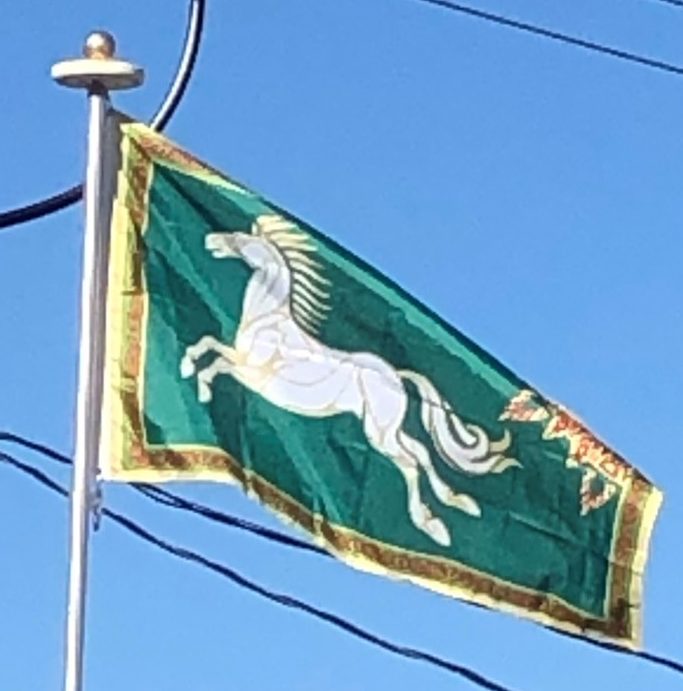Rohirric bears a similar relationship to the Common Speech of Middle-earth as that of Old English to modern English, and so Tolkien renders Rohirric names and phrases into Old English (Anglo-Saxon), just as the Common Speech is translated into English. Examples include words such as Mearas (Old English for horses) and éored. Tolkien was a philologist, with a special interest in Germanic languages. See separate article “Rohirric”.
Many archaic Hobbit names bear similarities to Rohirric, since the ancestors of the Shire hobbits lived on the upper reaches of the Anduin, close to the ancestors of the Rohirrim, and there was apparently a good deal of linguistic cross-fertilisation. The name Hobbit itself is believed to be derived from the Rohirric Holbytlan(hole builders). These names are also translations of the original Westron Kuduk (Hobbit) and Rohirric kûd-dûkan (hole dweller), of course.
Politics:
Alliance with Gondor:
The alliance between Rohan and Gondor came into existence in TA 2510. In that year the Easterlings launched a massive invasion of Gondor. The army of Gondor was defeated and trapped between the Limlight and the Celebrant. Gondor, which had always been on friendly terms with the different tribes of the Northmen, sent messengers to the closest tribe, the Éothéod. Although it was unlikely that the message calling for aid would come through, it did. Then Eorl the Young and his fierce Éothéod Riders unexpectedly took the field during the Battle of Celebrant and turned the tide in the favour of Gondor. As a reward Cirion, the Steward of Gondor, gave Eorl the depopulated province of Calenardhon for his people to settle, while fulfilling Gondor’s need for a strong ally. The Oath of Eorl was sworn by both Cirion and Eorl. Neither nation has broken the alliance ever since. Rohan has gone through great lengths to fulfill its part of the treaty including sacrificing two of its heirs when Gondor was under threat from the Haradrim in TA 2885, when Fastred and Folcred, the twin sons of King Folcwine, were killed during the Battle of Crossings of Poros. King Théoden once again honoured the alliance in the Battle of the Pelennor Fields.
War with the Dunlendings:
To the west of Rohan lived the Dunlendings, a native people who had been hostile to the Free Peoples for a long time. The Dunlending Wulf briefly was a usurper of the throne of Rohan during the long winter.
Rumours of Tributes Paid to Sauron:
During the early days of the War of the Ring, rumours were spread that the Rohirrim supplied Sauron’s armies with horses. These rumours were obviously false: the Rohirrim valued their horses more than anything, and would never send them away, even as tribute. Still, these rumours had some effect, in that they obscured the fact it was Saruman who had fallen, rather than Rohan. The basis of the rumour was that Sauron’s orcs on raids into Rohan stole their horses for use in Mordor’s army, but this was outright theft that angered the Rohirrim against Sauron.
Wormtongue’s Influence:
When King Théoden began to grow old, he took as an adviser Gríma, later called Wormtongue. Gríma quickly became Théoden’s chief adviser, but unknown to all he was secretly working for Saruman. Gríma played on Théoden fears to further weaken the strength of the king and all of Rohan, always advising retreat where an attack was needed. He may have also begun poisoning the king at this time. This nearly proved disastrous for Rohan, and also for Gondor, by robbing them of their strongest ally in the north. Gríma Wormtongue’s plans were not revealed until Gandalf arrived at Edoras during the War of the Ring.
Rohan’s Military:
The Rohirrim are descendants of the Edain of the First Age. They didn’t go to Beleriand like the Edain who were later rewarded with the island of Númenor by the Valar. The ancestors of the Rohirrim were known as the Éothéod and were given the province of Calenardhon by Gondor after the aforementioned Battle of the Field of Celebrant.
